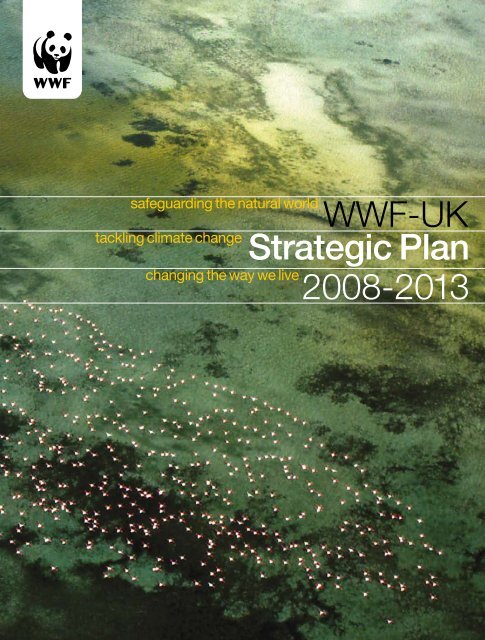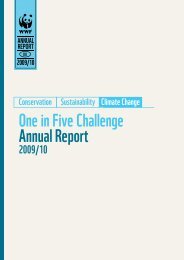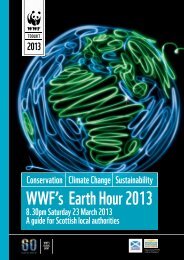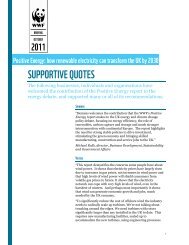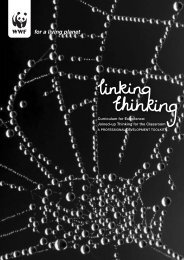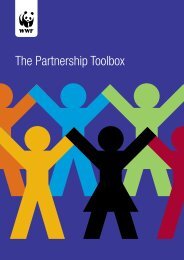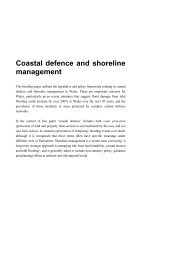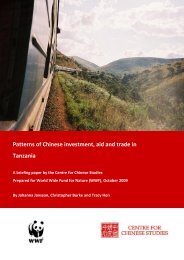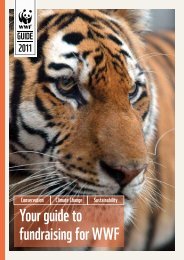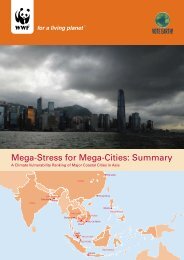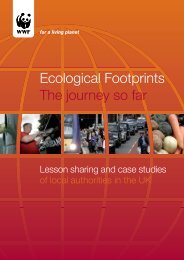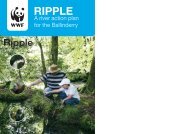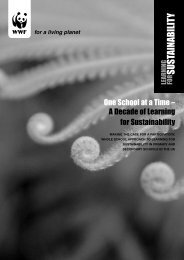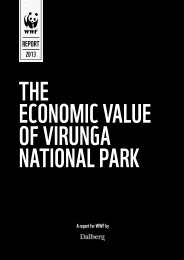Create successful ePaper yourself
Turn your PDF publications into a flip-book with our unique Google optimized e-Paper software.
“<strong>WWF</strong> is not just aboutsaving whales and tigers andrainforests, and preventingpollution and waste, but isinescapably concerned withthe future conduct, welfare andhappiness and indeed survivalof mankind on this planet.”Max Nicholson, one of the founders of <strong>WWF</strong>About <strong>WWF</strong>-<strong>UK</strong>We are the <strong>UK</strong> affiliate of the <strong>WWF</strong> Network, theglobal environmental organisation founded in 1961and now active in over 100 countries. Using ourunique combination of practical experience,knowledge and credibility, our 300-strong staff workwith governments, businesses and communitiesboth here in the <strong>UK</strong> and around the world so thatpeople and nature thrive within their fair share of theplanet’s natural resources. In 2007/8 we spent£42m on our work; most of our income comesfrom our dedicated members and supporters.
How we meet the threat<strong>WWF</strong> is creating solutions to the most serious environmental problemsfacing our planet, helping people and nature to thrive.3What we doThe growing environmental threat tothe planet over the past two decadeshas increased the complexity of thechallenges <strong>WWF</strong> faces andbroadened the scope of our work.As well as working to improve theprotection and governance of theworld’s most special wildlife andplaces, we now tackle global issuessuch as climate change and people’sincreasingly unsustainable lifestyles.In addressing the <strong>UK</strong>’s current ‘threeplanet’lifestyle, we strive for what wecall a ‘One <strong>Plan</strong>et Future’ – wherepeople and nature live in harmony,thriving within their fair share of theplanet’s natural resources.We take this holistic approach,recognising that the well-being ofpeople and nature is intimately linked.People can’t thrive without aflourishing natural environment.Nature can’t thrive without carefulstewardship by people. They sharethe same planet, share the samelimited natural resources andultimately share the same future.Our global priorities therefore focuson helping nature to thrive andreducing humanity’s global footprintto a sustainable level.Our strategic planWorking with others, includinggovernment, business andcommunities, we will focus onthree main challenges in thecoming five years:Safeguarding the natural worldNature’s most outstanding wildlife andplaces (on land and in our oceans,rivers and lakes) are under severethreat from habitat destruction andover harvesting. We will provide bothpractical support at a local level forwildlife, habitats and communities,and broader policy solutions thataddress the runaway demand fornatural resources and help peoplevalue nature.Tackling climate changeThe continuing growth of greenhousegas emissions could result indevastating consequences for peopleand nature. We will seek cuts inemissions at a <strong>UK</strong>, EU and global levelthat prevent global temperaturesrising dangerously. We will alsodevelop solutions that address theunavoidable effects of climate change,helping to protect what ourconservation work has alreadyachieved.Changing the way we liveThe planet can no longer support thedemands people make on its naturalresources. We will forge solutions thathelp people enjoy more sustainablelifestyles, addressing humanity’sglobal footprint through action onissues such as transport, food,housing and energy.Safeguarding thenatural worldOur most specialwildlife and placesare valuedTackling climatechangePeople and naturehave a better chanceto flourishPeople andnature thrive …… a One <strong>Plan</strong>etFutureChanging the waywe livePeople enjoysustainable lifestyleswithout harmingnature
4Our goals by <strong>2013</strong>Safeguarding the natural worldThe growing and unsustainabledemand by people for naturalresources is putting the naturalworld under severe pressure.Globally, 23% of all mammalspecies, 32% of amphibians and12% of birds are threatened withextinction. The rapid destruction offorests – every year an area the sizeof England is lost – not only harmsforest-dwelling people and wildlifebut also adds to the growing dangerof climate change.The increasing threat to some of theplanet’s most important rivers, lakesand wetlands has been matched by a29% decline in populations offreshwater wildlife in just 30 years.And in the oceans, 40 million tonnesof bycatch (including 300,000 marinemammals) are caught accidentallyeach year when targeting otherspecies.The threat to people and theirlivelihoods is of equal concern. Forexample, more than a billion peopledo not have access to clean water.Some 250 million people worldwideearn their living from fishing.Around the world <strong>WWF</strong> works with awide range of partners in business,government and local communitiesto create sustainable solutions thattake account of the needs of bothpeople and nature.Our practical conservation work withour colleagues in the global <strong>WWF</strong>Network focuses on safeguardingwildlife and places considered by<strong>WWF</strong> to be of global importance.This is supported by policy initiativesat a <strong>UK</strong>, EU and global level –creating the commercial and legalframeworks that ensure goodgovernance of natural resources.Our goals: forestsTimber trade:ensure by 2012 that the EU hasadopted legislation which outlaws thetrade in illegal timber and woodproducts, and that key countries,where logging takes place, canengage in voluntary agreements withthe EU to address illegal logging; andin the <strong>UK</strong>, achieve increasedgovernment procurement of legal andsustainable timber by 2010 and a20% reduction in imports of illegal andunsustainable timber by <strong>2013</strong>.Amazon:ensure that governments of at leastthree of the nine Amazon countries(including Brazil, which contains 70%of the Amazon) introduce effectivemeasures to reduce deforestation anddesignate more priority forests asprotected areas; and ensure that 30%of the total <strong>UK</strong> demand for beef, soy,sugar and palm oil (the top fourcommodities impacting the Amazon)require globally-recognisedsustainability standards for theirproduction.Borneo:ensure that key <strong>UK</strong> buyers of timberand palm oil from Indonesia andMalaysia promote environmentallycertifiedproducts, and major <strong>UK</strong>investors in these sectors adopt<strong>WWF</strong>-endorsed sustainable financestandards; and identify opportunitiesfor the <strong>UK</strong> banking sector to linkbilateral debt swaps to conservationand sustainable development.Colombia:stabilise forests by 2012 by increasingprotected areas and reducing illegallogging and the impacts of oil palmexpansion. Our work includesinfluencing the <strong>UK</strong> commoditiesmarket (particularly palm oil) andworking to reduce carbon emissionsfrom deforestation.East Africa:establish by 2011 a measurableincrease in the legality andsustainability of timber production andtrade in and from the region’s coastalforests.Himalayas:gain a commitment by 2010 from thegovernments of Bhutan, Nepal andIndia to conserve the importantspecies and habitats of the EasternHimalayas; establish mechanismsthat manage the impact of climatechange in two river basins in theregion; and promote sustainableenergy technologies that reduce thedemand for local timber.New Guinea:declare a moratorium by 2012 on allnew logging concessions in PapuaNew Guinea; work for logging incometo be replaced by more sustainablealternatives (including forest carboncompensation); and ensure by 2012that higher sustainability standardsare agreed by the banking, forestry, oiland gas, oil palm and mining sectors.<strong>UK</strong> commodities trade:ensure the <strong>UK</strong> government supportsthe sustainable sourcing of keycommodities responsible for theconversion of forests to agriculture;and all major <strong>UK</strong> retailers useenvironmentally-certified palm oil andcommit to sustainable productionmethods for soy, biofuel, sugar,cotton and beef.
5Food for thoughtSince 1990, the Amazon rainforest has beendestroyed at a rate of up to 27,000 sq km each year –an area almost the size of Belgium. A major cause isthe clearance of forest for cattle grazing to producebeef, and to grow soya which is used to feed animalsacross the world. In the <strong>UK</strong>, our demand for beef, soyaand other commodities impacting on the Amazon istaking its toll. It is estimated that 2% of Brazil’s landarea is used to feed <strong>UK</strong> consumption. <strong>WWF</strong> iscampaigning to minimise the impact that foodproduction has on the planet.All images © Brent Stirton / Getty Images / <strong>WWF</strong>-<strong>UK</strong>
© D Walkington / <strong>WWF</strong>-<strong>UK</strong>Helping communities, helping mountain gorillasA <strong>WWF</strong>-backed initiative* is helping to prevent the needfor people to encroach into protected wildlife parks thatform the last strongholds of the world’s remaining 720mountain gorillas, in Rwanda, Uganda and theDemocratic Republic of the Congo. For example, localsare paid to remove stones from their farmland, helpingto improve the quality of the soil. They are then paid touse the stones to build a wall around the perimeter ofthe parks. This helps to prevent buffalo in the park fromraiding farmers’ crops, and people to cultivate fieldscloser to the park boundary, thereby increasing cropproduction and income.* The International Gorilla Conservation Programme,which is supported by <strong>WWF</strong>, the African Wildlife Foundationand Flora & Fauna International.© C Christoph Corteau/naturepl.com
7Changing the way we live© Richard Stonehouse / <strong>WWF</strong>-<strong>UK</strong>Arctic voyager witnesses climate changeEmma Biermann was one of 18 young people fromaround the world chosen to join <strong>WWF</strong> on a journey tothe Arctic, where she learned about the critical rolethis region plays in regulating the global climate. Shealso witnessed the impact climate change is alreadyhaving on glaciers, sea ice and wildlife. “The situationis far more urgent than we had perceived,” saidEmma. “Visiting the Arctic and hearing the scientificbackground has confirmed how urgent this issue is.”She is now actively supporting <strong>WWF</strong>’s ongoingclimate change campaign, and delivered a petitionto Downing Street calling on the government tocommit to reduce the <strong>UK</strong>’s CO2 emissionsby at least 80% by 2050.© Sindre Kinnerød / <strong>WWF</strong>-Canon
© Getty ImagesInspiring a greener futureEngaging and inspiring young people to reconnectwith nature is one of the key ways to achieve a futurewhere we live within the ecological limits of the planet.<strong>WWF</strong>’s new One <strong>Plan</strong>et Schools programme aims todo exactly this, by putting sustainability at the heart ofschool life. We are focusing on making school groundsand buildings greener, delivering a curriculum thatgives young people the skills and knowledge to livemore sustainably, and ensuring that teachers andchildren demonstrate to the wider community howpositive behavioural changes can be achieved.© David Southern
11Our goals by <strong>2013</strong>Changing the way we liveGlobally, people are using about25% more natural resources thanthe planet can replace. In the <strong>UK</strong>,we’re consuming three times ourfair share of the planet’s naturalresources. We face an ‘ecologicalovershoot’ that will have severeconsequences for both peopleand nature unless we humanschange the way we live.Although advances in technologyhave helped people to producethings more efficiently, the benefitshave been swamped by ever-higherlevels of consumption by affluentindustrialised economies and thegrowing middle classes in thedeveloping world.Some 70% of humanity’s globalfootprint arises from carbonemissions; other pressures are linkedto commodities such as crops, meat,fish and wood, and the freshwaterwe take from rivers and lakes.<strong>WWF</strong> is seeking a One <strong>Plan</strong>et Futurewhere both people and nature thrivewithin their fair share of what’savailable. We are developing a rangeof One <strong>Plan</strong>et sustainability initiativesto support this goal, helping to bringsustainability and equity toproduction, trade and consumption.With an established track record insupporting the development ofsustainable lifestyles, <strong>WWF</strong> iswell placed to provide leadership inhelping to reduce the <strong>UK</strong>’s footprintand supporting other countries todo the same.Our goalsOne <strong>Plan</strong>et Economy:building on our vision for a sustainableeconomy, develop a strategy for the<strong>UK</strong> and EU to adopt footprint targetsby 2009; have in place by 2011 arobust set of European footprintindicators that can be used alongsideGDP measurements; and ensure <strong>UK</strong>public policies are implemented by2012 that measure and contribute tofootprint reduction.Key <strong>UK</strong> economic sectors:undertake practical work withpartners in local government andbusiness to help reform key <strong>UK</strong>sectors such as transport, food,housing and energy; and use thepartnerships we develop to influencenational and European policy. This willinclude launching a One <strong>Plan</strong>et Foodcampaign in 2009.Working with the developing world:with partners in the <strong>WWF</strong> Networkand other non-governmentalorganisations, support current <strong>WWF</strong>global initiatives on tackling povertyand creating sustainable trade anddevelopment with and in thedeveloping world; and ensure by2011 there is a greater adoption ofand capacity to use footprintmeasures among the emergingeconomies (especially Brazil, Russia,India and China).One <strong>Plan</strong>et Finance:working with key finance leaders andour <strong>WWF</strong> network partners, developan action plan for the <strong>UK</strong>-basedfinance sector by 2010 that will deliverfootprint reduction; help establishLondon as the global leader in greenfinance by 2011; and by 2012 havefive footprint-reducing initiatives underway. We are well placed to influencechange because the <strong>UK</strong> is a primarycentre for global finance and 70% ofcarbon markets trade throughLondon.One <strong>Plan</strong>et Schools:Working with education leaders,teachers and young people, by 2010increase the capacity of schools to putsustainability at the heart of everythingthey do (curriculum, campus, cultureand community). To establish by2012 a ‘centre of excellence’ onsustainability leadership and learningthat is recognised by influentialthinkers and practitioners in theeducation field.One <strong>Plan</strong>et Cities:launch a ‘One <strong>Plan</strong>et Cities’ actionplan by 2009 to support sustainabilityinitiatives for cities that have a regionalor global impact such as Barcelona,Freiburg, London and Stockholm; rollout with partners in the <strong>WWF</strong> Networkat least two pilot city projects by 2010;and ensure there is a demonstrablefootprint reduction in the pilotcities by 2012.
12Why we make a differenceThe <strong>WWF</strong> NetworkWith almost five million supportersand working in more than 100countries around the world, the <strong>WWF</strong>Network is a powerful force forchange. Being part of this globalnetwork means we can workcollaboratively, pooling our collectiveresources and talents, and focusingon activities that have the most impactworldwide. Our priorities for thecoming five years are rooted in thisjoined-up approach.Our track recordWe have a worldwide reputation asa leading expert and a measuredand principled contributor onenvironmental issues. The goals wehave set ourselves in the coming fiveyears are based on a firm foundationof scientific evidence and practicalexperience. Our successful trackrecord working with government andbusiness means we can help developthe policies and standards that deliverour key objectives. Our wide-rangingwork with communities in some of theworld’s most threatened wild placesoffers practical solutions for localproblems.Our partnershipsOur approach is to work with partners– business, government, nongovernmentalorganisations and ourown supporters – to achieve ourobjectives. Our reputation for beingaccountable, inclusive andconstructive means we can bring abroad range of stakeholders to thediscussion table as well as contributeto the debate in a positive way. It alsomeans that when a more challengingstance is needed, our views are givengreater weight.Communicating andinfluencingTo deliver global change we engagewith politicians in Brussels,Westminster, Cardiff, Holyrood andStormont; run <strong>UK</strong> campaigns ontransport, food, housing and energy;and make sure <strong>WWF</strong>’s messagesabound in the media. We workconstructively with progressivebusinesses, challenge ‘greenwash’and campaign against those whorefuse to change. We have alsodeveloped a powerful internationalvoice by developing solutions that canhave a global impact and by taking fulladvantage of the <strong>UK</strong>’s influential role,both as an international trading centreand as a major political player in theEU and other international bodiessuch as the UN.Funding our strategyWe have developed a robustfundraising strategy to deliver ourambitious plans for the coming fiveyears. We aim to grow considerablyfaster than inflation, and will invest toincrease our supporter numbers. Wewill bring in more funds fromcompanies and government sourcesthrough relationships which are notjust about funding but also aboutchanging their policies and practiceson the issues we care about. We willalso develop a new programme formajor individual donors.Helping our people to deliverPeople are our biggest asset indelivering our mission. We willcontinue working hard to ensure thatall our staff are valued and torecognise people’s career needs.This will help us achieve our vision of<strong>WWF</strong> as an efficient organisation inwhich every employee understandsthe big picture, achieves results, andworks well together and individually.We are continuing to reduce <strong>WWF</strong>’sown footprint – this includes aimingto reduce our travel CO2 by 25%between 1994 and 2010. With thelease due to expire on our main officeand with the offer of a significantdonation, we will build a new state-ofthe-art,green headquarters.
© <strong>WWF</strong>-<strong>UK</strong> / A.P.S.© Yi Fei Zhang / <strong>WWF</strong>-CHINAFighting floods naturallyNatural flood defences, developed by <strong>WWF</strong> inpartnership with HSBC, helped to protect thousandsof homes and businesses from devastating floods thathit Doncaster in summer 2007. The area around thewetland reserve we helped to extend at Potteric Carr,in south Doncaster, coped far better with the floodsthan the man-made defences elsewhere in the citydid. Under our continuing partnership with HSBC,<strong>WWF</strong> is helping to protect some of the world’s majorrivers – the Amazon, Ganges, Yangtze and Thames –from the impacts of climate change, benefitingthe 450 million people who rely on them.Now you’ve read about our plans,we’d like to hear from you.We build rewarding partnershipswith the business world – workingtogether to deliver our vitalconservation programmes andadvance sustainability policyand practice.We work with politicians of allparties at the devolved, <strong>UK</strong> andEuropean levels – helpingparliaments and assemblies totake action on climate change,resource use and the protectionof nature.We also develop strong andlong-lasting relationships withour personal supporters,whose financial support andcampaigning voice enablesus to achieve so much.Find out more by calling us on01483 426333, emailingstrategy@wwf.org.uk or visitingwwf.org.uk/takeaction
safeguarding the natural worldtackling climate changechanging the way we live<strong>2008</strong>-<strong>2013</strong><strong>WWF</strong>-<strong>UK</strong>Panda House,Weyside ParkGodalming,SurreyGU7 1XRt: 01483 426444f: 01483 426409<strong>WWF</strong> ScotlandLittle DunkeldDunkeldPerthshire PH8 0ADt: 01350 728200f: 01350 728201The mission of the international <strong>WWF</strong> network is to stop thedegradation of the planet’s natural environment and to build afuture in which humans live in harmony with nature, by• conserving the world’s biological diversity• ensuring that the use of renewable natural resources is sustainable• reducing pollution and wasteful consumptionwwf.org.uk<strong>WWF</strong> CymruBaltic HouseMount Stuart SquareCardiffCF10 5FHt: 029 2045 4970f: 029 2045 1306<strong>WWF</strong> Northern Ireland13 West StreetCarrickfergusCo AntrimBT38 7ARt: 028 9355 5166f: 028 9336 4448<strong>WWF</strong>-<strong>UK</strong>, registered charity number 1081247 and registered in Scotland number SC039593. A company limited by guarantee number 4016725© 1986 Panda symbol and ® “<strong>WWF</strong>” Registered Trademark of <strong>WWF</strong>-World Wide Fund For Nature (formerly World Wildlife Fund) Printed on recycled paperProject number 2549 / July <strong>2008</strong> Cover Image: © Frederick J. WEYERHAEUSER / <strong>WWF</strong>-Canon


